10 Reasons Why Kids Should Learn Robotics That Enhance Their Mindset
10 Reasons Why Kids Should Learn Robotics That Enhance Their Mindset
In today's digital world, robotics plays a crucial role in education, helping children develop problem-solving, creativity and STEM skills. Robotic classes for kids provide hands-on learning experiences that prepare them for the future. This article explains 10 key reasons why children should learn roboticsprogramming and how it enhances their cognitive abilities.
Introduction
Technology is changing fast. Robotics education is now a key part of learning today. Robotic classes for kids introduce them to a world where they can build, program and control robots while developing crucial technical skills. These online robotics courses and roboticslessons help children understand robotics fundamentals, improve problem-solving and spark creativity.
Learning robotics helps kids in elementary and middle school. They get hands-on experience with computer programming, automation and robotic systems. It boosts their understanding of science, electronics and engineering. This prepares them for a future where technology plays a big role.
Parents exploring coding classes online fees will find these robotics programs for elementary schools and robotics for middle schoolers valuable in shaping their children's skills.

Reasons To Learn Robotics
Robotics offers children an exciting way to develop crucial life and technical skills. Below are 10 key reasons why kids should learn robotics and how it benefits their overall life and mindset.
Robotics Helps Kids Learn to Think Creatively and Critically
Kids are encouraged to think out of the possible box of robotics lessons. While children engage in robotics projects, they experiment with different ideas, test solutions and improve their designs.
Problem solving would be further improved among children participating in robotic classes for kids as they program robots. They learn to analyze challenges and develop innovative ways to complete tasks. These skills will be necessary for teaching computer science, robotics knowledge, industrial engineering and automation.
Programming robots introduces children to Robotics, Artificial Intelligence and Machine Learning. It also helps them understand how technology and machines impact the real world.
Robotics Helps Kids to Increase Their Problem-Solving Abilities
Students are often involved in challenges that require logical thinking while doing work on robotics and other topics. It allows them to disintegrate an issue, test a proposed solution, and improve an approach or technique. This promotes their capacity to perform tasks.
In robotic classes for kids, Students gain real-world experience in robotics classes. They build complete robots that can perform actions relevant to real-life situations. A robot can follow a path that has been programmed-path 'where to go' or 'do this.' There’s a lot to do in computer science and electrical engineering beyond just strong thinking.

Learning Robotics Helps Kids Learn and Understand Coding
In robotics programming, children learn to switch on the light to computer programming. Through robotics lessons, they are taught to program robots in coding languages, which acts as an helping factor in their growth as advanced software developers.
Various robotics programs may include computer-aided design (CAD), where children learn to design and simulate robot systems. It is excellent from the standpoint of kids who wish to grill engineering studies in robotics, robotics technicians or even software developers.
Robotic classes for kids also strengthen their technical proficiency, making robotics for middle schoolers and robotics programs for elementary schools excellent platforms for building future-ready skills.
Robotics Helps Kids Learn 21st-Century Skills
In today’s world, learning robotics provides children with essential skills and knowledge needed for future careers. Robotics topics like Automation, Machine Learning and Artificial Intelligence are growing in importance across many industries.
Enrolling in robotics classes for kids helps them to build critical thinking, digital skills and even teamwork skills. These skills are key for success in the 21st century.
Robotics Helps Children Learn Many Science & Math Concepts Practically
Robotics classes help children understand key science and math concepts through hands-on experience. They don’t just learn theories from textbooks, instead they apply these ideas in real life. They build robots and program them to do tasks.
These hands-on experiences boost their grasp of electronics, electrical engineering, and mechanical engineering. As a result, they are well-prepared for further studies in computer science and engineering. Robotics programs for elementary schools and middle schoolers provide an excellent foundation for future technical careers.
Robotics Develops Teamwork and Collaboration Skills in Kids
Many robotics programs include teamwork. Kids work together to design and build robotic systems. This teamwork boosts their skills. They learn to communicate well, delegate tasks and work together towards a shared goal.
When kids work on robotics projects, they build leadership and problem-solving skills. These skills matter for future jobs and career opportunities in robotics engineering, industrial engineering and software development.

Robotics Encourages Kids to Try New Ideas
In robotics classes, kids try out various fundamentals and test new designs. They create robots by trying things out. They learn to improve their ideas from what happens in the real world.
Through robotics lessons, kids develop creativity and the confidence to think independently. They learn about automation and artificial intelligence. These fields are shaping the future of robotics careers. Enrolling in robotic classes for kids fosters innovation and helps children understand robotics programming in depth.
Robotics Teaches Kids to Handle and Overcome Failure
Failure is an essential part of learning robotics. When kids face challenges while programming or assembling robots, they learn persistence and resilience.
By continuously improving their robotics projects, children understand that failure is a step towards success. This mindset prepares them for future job challenges in engineering, automation and computer science.
Robotics Helps Kids to Learn Motor Skills
Building and programming robotic systems require precise hand-eye coordination. Through robotic classes for kids, children develop fine motor skills, which help to teach them perform delicate tasks with accuracy.
The hands-on training and experience gained in robotics training improves their ability to manipulate small machines and components, preparing them for fields like electrical engineering, mechanical engineering and robotics engineering.
Robotics Helps to Build Self-Confidence
Completing a robotics project gives a child the feeling of success. Robotics programming shows clear results in problem-solving and critical thinking skills. Kids often connect with these outcomes, boosting their confidence.
Confidence derived from robotics knowledge gives children an allowance to explore more advanced and complicated robotics curriculum learnings. When kids share their confidence in school, they inspire each other. This encouragement helps them pursue careers in STEM fields.
Conclusion
Robotic classes for kids offer more than just tech skills. They also boost problem-solving, teamwork, creativity and confidence. These essential skills prepare children for success in the digital world.
As robotics careers grow in automation, AI and engineering, kids benefit from early exposure to robotics. It helps them learn computer programming, electrical engineering basics and robotic systems.
Through robotics programs and online robotics courses, students gain hands-on experience at their own pace. Robotics courses and projects teach key skills for success in science, technology and engineering.
Learn Robotics Programming - FAQs
How do robotics programs for elementary schools help students develop teamwork and collaboration?
Robotics programs for elementary schools include hands-on group activities where students work together to program robots and build functional models. These classes encourage teamwork, communication, and problem-solving skills. Students learn to divide tasks, share ideas and also tackle challenges together. This teamwork builds skills important for robotics and other STEM careers.
What is robotics class and what skills can children acquire through participating in a robotics class?
A robotics class teaches children the basics of robotics, engineering and computer programming. Through these robotic classes for kids, students develop technical skills such as coding, mechanical design and electrical engineering concepts. They also boost logical thinking, problem-solving and creativity. These skills are valuable in robotics engineering and automation.
How can robotics study guide kids toward STEM career pathways in the future?
Engaging in robotics study allows children to explore robotics topics such as Machine Learning, Artificial Intelligence and Industrial Engineering. Learning about robotic systems and computer science at an early age helps them develop an interest in career opportunities in robotics careers, software development and mechanical engineering. Kids who study robotics gain a strong foundation in engineering concepts, making them well-prepared for advanced robotics programs and professional certificates.
What are the first steps for kids to take when learning robotics?
Beginners can start learning robotics with kits like LEGO Mindstorms or Arduino. These tools help build a solid foundation in robotics. Online robotics courses teach kids programming and help them grasp basic concepts. With experience, they can take on advanced robotics projects. Here, they learn to program robots and use them for real-world tasks.
What key concepts do children learn in robotic classes for kids?
In robotics classes for kids, students dive into the basics. They work with circuits, sensors, motors and software programming. They also learn about electrical engineering, computer-aided design (CAD) and problem-solving strategies. Robotics topics boost kids' analytical thinking and creativity. They also prepare them for future jobs in technology, electronics and industrial automation.
Why is robotics for middle schoolers an important skill for their future careers?
Robotics for middle schoolers teaches them about robotics programming, automation and software engineering. These skills are crucial for careers in robotics engineering, robotics technicians and artificial intelligence development. Participating in robotics programs helps students gain key skills for STEM jobs. This prepares them for future careers in science, technology and engineering.
Comments
Your comment has been submitted